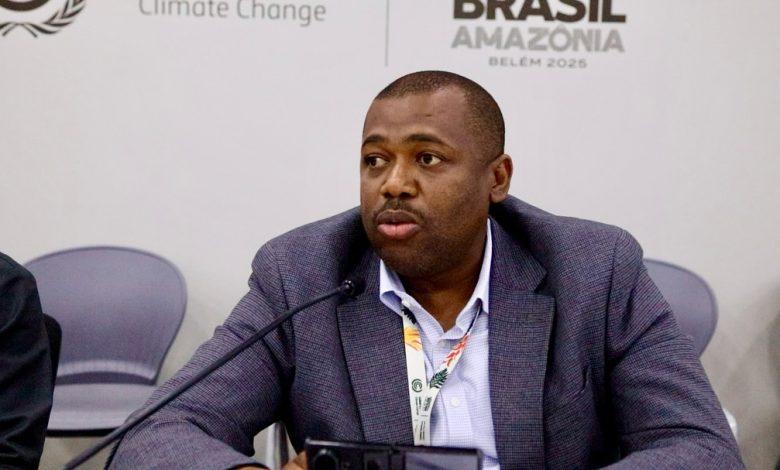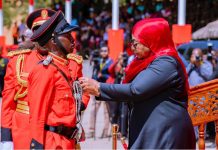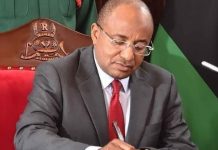Africa-Press – Tanzania. THE United Nations Capital Development Fund (UNCDF) has agreed to continue partnering with Tanzania in implementing the second phase of the Local Climate Adaptive Living (LoCAL) Programme.
Through the programme, the government is implementing an 11-million US dollar climate resilience and adaptation project in 18 councils across Mainland Tanzania and Zanzibar.
LoCAL phase II focuses on scaling up locally led adaptation efforts and mobilising climate finance for vulnerable communities.
This was revealed during a bilateral meeting between the Deputy Permanent Secretary in the Office of Vice-President (Union and Environment), Mr Abdallah Mitawi, and an official from UNCDF, Mr Damiano Borgogno, on the sidelines of the 30th Conference of the Parties to the United Nations Framework Convention on Climate Change (COP30) taking place in Belém, Brazil where Tanzania is participating.
Similarly, in their discussions, the UNCDF also expressed interest in collaborating with the government of Tanzania in other areas related to sustainable environmental conservation.
Deputy Permanent Secretary Mitawi expressed gratitude to the organisation for its continued support of the government’s efforts in environmental management, particularly in strengthening resilience to the impacts of climate change.
He said that the government will continue to cooperate with development partners to attract more projects, thereby positioning Tanzania as a country with sustainable development in the environmental sector.
One of the areas of collaboration highlighted was the Blue Economy, a rapidly growing sector that can stimulate economic growth for citizens and the nation as a whole if its resources are utilised effectively.
The Office of the VicePresident has already established a special unit to coordinate the Blue Economy and continues to oversee the implementation of the Blue Economy Policy (2024) and its strategy.
COP30 continues to bring together development partners and leaders from the government of Tanzania to discuss various development issues and mobilise financing for the benefit of the country.
Meanwhile, the African Group of Negotiators on Climate Change (AGN) has underscored its commitment to strengthening Africa’s unified and influential presence in global climate negotiations, calling for sustained political, technical and financial support to address persistent capacity challenges across the continent.
The remarks were delivered by the Special Envoy and Presidential Advisor on Environment and Climate Change and Chair of the AGN, Dr Richard Muyungi, during the Group’s 30th anniversary celebrations held on the sidelines of the COP30 Conference in Belém, Brazil.
Speaking before ministers, development partners and climate stakeholders, Dr Muyungi reflected on the evolution of the AGN, tracing its formation to the 1995 Berlin Mandate where African negotiators first united to advance a common position on climate action.
“That moment marked the beginning of a coordinated African response to global climate negotiations and laid the groundwork for our engagement in shaping landmark agreements such as the Kyoto Protocol and the Paris Agreement,” he said.
He noted that over three decades, the AGN has matured into one of the most organised and influential blocs within the UNFCCC system, recognised for its consistency, strategic coordination and leadership in advocating for fairness, equity and climate justice for vulnerable nations.
“Our unity remains Africa’s greatest asset. It has enabled us to amplify our collective voice and defend shared interests despite the diversity of our 54 member states,” Dr Muyungi emphasised.
However, he acknowledged that the Group continues to face structural and operational challenges, particularly limited technical capacity, inadequate funding and insufficient institutional support, which affect effective participation in increasingly complex climate negotiations.
“The technical nature of current negotiations demands continuous investment in skills, expertise and institutional strengthening if Africa is to fully influence decisions that shape its future,” he said.
Dr Muyungi called for targeted support in capacity building, improved coordination frameworks and stronger partnerships with continental institutions including the African Union, AMCEN and regional economic communities.
“These efforts are essential to ensure Africa’s development priorities, resilience needs and adaptation goals remain firmly anchored in global climate decision-making processes,” he added.
He further commended ministers, technical experts and development partners for their sustained contribution to the AGN’s growth, noting that their assistance has reinforced the continent’s negotiating capacity and nurtured a new generation of climate leaders.
For More News And Analysis About Tanzania Follow Africa-Press







